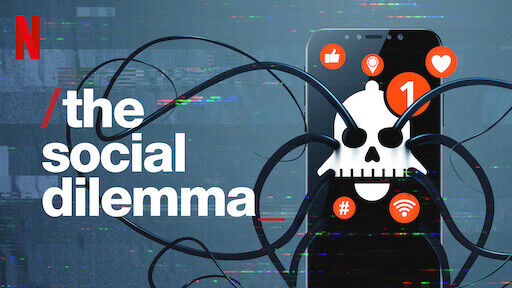The Social Dilemma and The Truth About Technology

The documentary “The Social Dilemma” premiered last year.
March 24, 2021
Released a year ago, the documentary “The Social Dilemma” is unlike any anti-device lecture your mother has ever hounded you with. The docudrama gives the ethicists, tech experts and so-called “computer philosophers” of Silicon Valley a platform to shed light on the perils of social media and the very technologies they created.
The film delves into how technology has the ability to sway elections, foster conspiracies and even spark mass civil unrest. In a way, the documentary predicted this event by depicting a fictionalized teenager being radicalized by the “extreme middle,” the film’s way of avoiding a political stance, through online sites and social media platforms. Meanwhile, the Capital riot was planned by far-right sites such as Parler, Gab, TheDonald and MeWe.
The documentary also asks viewers to be introspective. Tristan Harris, a former Google Design ethicist, shares how e-mail is his Achilles heel. To combat the tendency to constantly update one’s inbox or refresh Instagram, Harris recommends turning off all notifications from social media apps in order to create some separation from our screens. Excessive screen time is something all parents worry about, but now that Gen Z is getting older, it is something they reflect on as well.
“The amount of time we’re on a computer or our phone is overwhelming because our lives revolve around a screen even more now” sophomore Mary Sweeney said.
However, others are left wondering if social media and screen time are really bad. The film argues yes and leaves audiences vowing to detox from these “time sucking” apps to engage in so-called “real” human interaction. However, in the midst of a global pandemic, social media has been all generations’ saving grace when it comes to maintaining relationships with friends and family.
Not only do older generations fear the “addiction” they believe younger generations have to social media, but also the apparent associations between excessive screen time and the increase of mental illnesses teenagers and young adults face today.
However, in a recent discussion with the University’s Patrick Markey Ph.D., he shared that most of his time is spent convincing parents that technology and social media use is not as harmful as they are made to believe. Markey explained that research linking social media to mental health issues such as depression are often based on faulty research and data collection.
“One percent of our depression and well-being has to do with social media relations,” Markey said.
He also emphasized that the use of “addiction” when discussing technology usage does not equate to the addiction one can develop with drugs or alcohol. Like anything else, while a person can overdo their time on their phone or computer, there are no official psychological criteria in existence for a so-called “social media addiction.”
In recent months, the positives of social media and technology have been demonstrated, as students are able to safely continue their education using Zoom and other sites.
“People don’t have to come to school if they don’t feel comfortable because everything is so easily accessible online,” sophomore Molly McKenna said.
Additionally, people have increasingly been using social media as a creative outlet. Seen especially during lock-down, apps such as TikTok have been used to break through social isolation, meet new people and enjoy a COVID-safe way of socializing during the pandemic. There are still questions surrounding the reality of these connections.
“Social media makes you feel as though you are connected to others but the connection often isn’t genuine and you end up suffering from that,” sophomore Hannah Murphy said.
The debate over whether the benefits of technology and social media outweigh their detriments continues on. More research is required for both arguments, however, due to the continuous development of technology and social media, a definitive verdict will likely never be reached on the matter.

